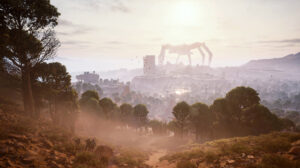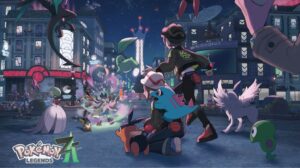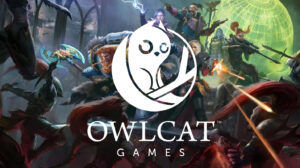“Creative Freedom is The Main Advantage of Working as an Indie” – An Interview With Disc 2 Games, A New Studio From Dredge Devs

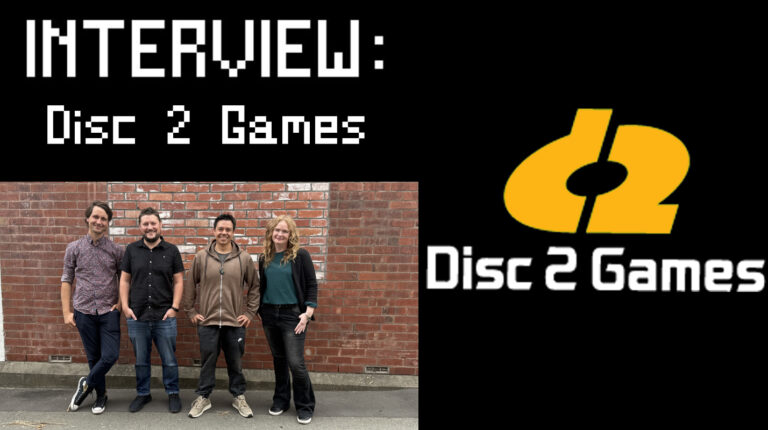
Disc 2 Games is a brand new indie studio formed by Black Salt Games (Dredge) colleagues Nadia Thorne and Michael “Mikey” Bastiaens, along with Kris Nicholson and Johannes Otte. The team is based in Christchurch, New Zealand.
They were happy to talk about the new studio’s ethos, possible game plans for the future, and their thoughts on the state of the industry. The team’s debut game was still under wraps at the time of this interview, but has recently been revealed: Canvas City is a rollerblade-themed turn-based tactics RPG and its release date is currently TBC.
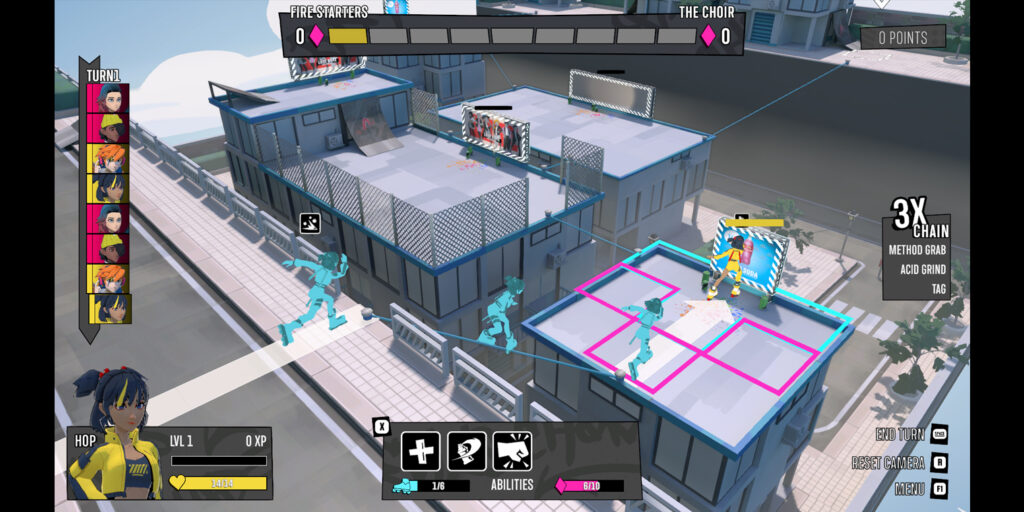
I’d like to start by talking about how it’s not uncommon for studios to develop their own subsidiaries. You’ve said on your official site that you’re “game developers brought together by a love of 90’s style games – modernized for current and new audiences.”
Could you please elaborate more on what you mean by this, and a follow-up comment you made concerning the aim of creating “fusion/stylish” games?
Kris: We wanted to get across that the style of a game from Disc 2 Games might look quite different than what you might expect from a Black Salt Games title. We don’t want to give too much away right now, but “Fusion” in this case refers to finding combinations of ideas that are interesting and maybe a little surprising.
If I could touch on something related to Dredge, in a launch interview with that team they spoke about how they were very set on not including multiplayer, as it would rightfully affect the mood of the game. Is Disc 2 Games considering multiplayer for any upcoming titles, or will you be focused on single player experiences?
Kris: We love single player experiences, but wouldn’t rule out multiplayer elements for future games I don’t think. I’m a big fan of couch co-op games so would love to do something in that vein at some point.
You’ve listed some game inspirations in a YouTube video, but what other media (music, films, etc) inspires the work of Disc 2 Games?
Nadia: K-pop. Lots from 90’s films and anime like Hackers and Sailor Moon. Chatter Rings.
Can you please give me a bit more background on the team’s history, in terms of: how did you all meet?
Kris: We all previously worked together for a number of years at neighbouring studio, CerebralFix. Nadia and Mikey broke out first with Black Salt Games along with Joel and Alex. About the time Dredge was releasing Nadia brought me and Johannes along for the ride to form Disc 2 Games. Funny story, Johannes and I hadn’t actually worked directly together before, but Nadia was pretty confident we’d make a good team. So far, so good!
What is the game development scene like in Christchurch/New Zealand?
Nadia: Small but incredibly supportive across NZ but especially in Christchurch. Alongside us at Disc 2 and Black Salt, we’ve got established studios like Digital Confectioners, Fnife Games, and CerebralFix, plus a wave of new teams starting to pop up.
What makes Christchurch stand out though is the collaboration between training institutes and the professional industry. From high school, through to university there’s such a strong pipeline for those creatives who are interested in game development or the development of adjacent skills.
What would you say are the main advantages and disadvantages to working as an indie studio?
Kris: Creative freedom is clearly the main advantage of working as an indie. We can take more risks than a larger developer would. We do need to be careful with scope though, since we’re each individually performing roles that would be done by multiple people. I like having more jobs though, keeps things interesting!
Mikey: I like how we do have the ability to define what our game is and isn’t and to set our own time frames to a degree. We are free to explore our own methods and try out things within an environment we have complete control over. The downside of this is that we only will have ourselves to blame if things go awry!
Dredge was released with a publisher; how much impact does this have on the actual creative process? Do you have a publisher lined up for the debut Disc 2 Games title, or is this something you’re considering?
Nadia: In our experience the impact the publisher had on the creative decisions was more tied to logistics and scheduling than them wanting to dip into the design. For example, if your publisher approves a DLC but wants it released by a certain time, that would impact your design.
We’re weighing up the publishing aspect at the moment – publishers have a great breadth of expertise that us smaller and newer studios really benefit from, however they are also mandated to be constantly looking for something bigger and better than your game. It will come down to what we believe will provide the best experience for our players.
How do you, personally and as a team, measure success, and what does success mean to you?
Kris: I guess the number one measure of success will be to do well enough to keep making more games! But personally I’d like the game to leave a lasting impression with people.
Nadia: The reviews tell you all! I’d rather 10 people play my games and love their time than 10 million play and not have an enjoyable experience – you can scale one but not the other!
Mikey: Success to me is hearing how much fun people have getting immersed into the worlds I am a part of creating and then being able to fund the next project so I can create more worlds and ideas I have with others. I’ve always loved creating and designing worlds and this line of work is all about doing that.
Johannes: Making something that resonates with people and leaves a lasting impression, I don’t want to make something that someone plays and forgets about as soon as they consume their next bit of media.
What’s your take on the current state of the industry? At both the AAA and indie levels.
Kris: I believe that a number of issues the AAA industry faces is related to how long it’s taking to make games. Not only does your game have to be a sure thing, but you need to predict what gamers will want in 6-8 years time. Coupling this with public companies trying to chase the current trend is just a recipe for disaster. We’re seeing a growing success in the indie and AA spaces and I suspect we’ll be seeing a growing number of successful AA games in the future.
Another way of saying that is developers will need to find a way to control scope to ensure their success. I think the indie space is doing well, but with tools making it easier and easier to make games, we could see a flood of games in the market making discoverability a real problem.
Nadia: I think we’re seeing innovation taking place more and more in the indie scene as the AAA projects are just so long and expensive now they can’t risk innovation, or by the time they release the innovation is no longer novel.
Mikey: I think the industry is sort of in a state of correcting itself. A lot of money was invested to create products that probably weren’t the experiences people were after. Now that those games are coming out of their development cycles and aren’t hitting targets they would have probably wanted and as a result we are seeing a lot of layoffs lately due to those decisions made years ago.
Big games with big teams don’t always mean a better product and games coming out of the Indie levels are proving that they can compete at the same level as big studios. Who would have thought that good games are capable of making good money!
The current state of the world seems like people are a lot more aware of how they want to spend their time and money and with so many options available with games and other sources of entertainment it becomes harder to compete with everything.
Related to this, Stop Killing Games is an ongoing topic at the moment. What is your opinion on this initiative?
Kris: I think as indie developers, our opinions probably won’t be too much different from players in general, but it is a complicated issue. As a player it definitely makes sense that games should stay available long term, especially if I’ve paid a one-time purchase that implies I “own” that game (even if terms of service says otherwise).
As developers, I can understand that for certain types of games keeping the online services for that game running indefinitely is impossible if the revenue from the game doesn’t cover the costs of running those services.
Also if certain licensing agreements expire then by law you can’t continue to offer it. If laws were to pass that enforced games to stay available, you’d probably find big developers shoe-horning a single player version of the game in so that they can take services offline without removing the game entirely. If that’s impossible for certain games, then the only solution I could see would be to have a process of “open-sourcing” the infrastructure side of a game to allow 3rd parties to continue operating it.
This could get very messy very quickly and it would definitely be harder to make games with online components having to plan for that eventuality.
Nadia: The more of this the better and lets make sure to highlight all of the developers and publishers who do make the effort to preserve these games. It’s not something that is easily enforceable in all situations I fear, but I would love it to become accepted as best practice as far as it is practical.
An analogy might be with Accessibility Features – it’s understood that not all games and developers will be able to provide accessibility options, but they are celebrated when they do and we as players have a higher expectation of big studios to step up.
Johannes: Bring back lan and dedicated servers, then a lot of this problem goes away, although these days cheating would probably be rampant. But I don’t know much about server multiplayer stuff, but it sure would we be nice if games didn’t die.
I’d like to circle back to the name, and clear call-back to older gaming. I grew up playing Amiga, and then PS1, with the weird little thrill of swapping discs/disks, that I do kind of miss as it was a nice tactile element to gaming.
Nadia: That’s exactly what we were hoping for!
What is it about older gaming, or ‘retro’ if you prefer, that speaks to you all so much? Is it a generational thing, related to your individual dev journeys, or something else?
Kris: Obviously nostalgia plays a huge part. I think there are lots of amazing advances that have been made in game design and technology over the years. Along with these, however, come a number of elements that potentially dilute (or negate) what we found so fun and interesting about games in the first place. Sometimes it’s fun to go back to when things were simpler.
Johannes: It’s hard to write of nostalgia, but things were just more experimental back in early 3D or when productions costs were lower. Wacky control schemes, mechanics and graphics are things I love. Nobody is making a game like OG Tomb Raider these days but I like when games have unique ways of jumping, moving and interacting with the world.
Finally, is this love of older games in any way tied to ideas of game preservation, either through keeping certain game styles/mechanics going, or the literal desire to ensure a game remains playable far into the future?
Kris: By nature of loving older games, of course we want to be able to keep playing them! I have a small collection of the games I loved growing up, but my consoles are getting old and are starting to die off one by one. The thought of not being able to play them again or share them with my kids is a sad one.
I wouldn’t say that directly influences the games we make per-se but there are things we find special about certain games and naturally some of those elements will make their way into the games we make.
Johannes: Physical media is just breaking down. I hope people can preserve as much as they can. But unfortunately I don’t have the time or money to start collecting this stuff. So hopefully more companies become kinder to emulation and other means of playing these games as it’s a shame to see them disappear.
Canvas City is Disc 2 Games’ debut title and is currently set for release on PC, with a possible Switch release TBD. It follows a group of rollerbladers in the titular city who are trying to take it back from the sterile corporations that have taken it over, through a mix of stylish turn-based tactics and RPG progression. The game features over 80 skills and abilities, as well as 12 recruitable characters to unlock.





